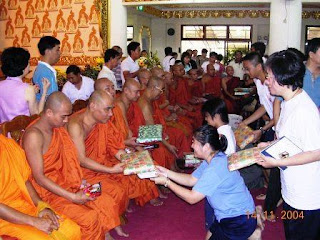The Two Truths
Buddhism discusses what are known as the two truths - the truths of conventional and ultimate reality. The concept of two levels of reality is not unique to Buddhism. It is a common epistemological approach in many of the ancient Indian schools. Followers of non-Buddhist Samkhya school, for example, explain reality in terms of twenty five categories of phenomena.
The self [Sanskrit: purusha; Tibetan: kye-bu] and the primal substance [Sanskrit: prakriti; Tibetan: rang-zhin] are said to be ultimate truths, while the remaining twenty three categories of phenomena are said to be manifestations or expressions of this underlying reality. However, what is unique in Mahayana particularly in the Madhyamaka or Middle Way School is that conventional and ultimate truths are not seen as two unrelated, independent entities but as different perspectives of one and the same world.
According to the Middle Way School of Buddhism, the ultimate truth or the ultimate nature of reality is the emptiness of all things and events. In trying to understand the meaning of this emptiness, we can turn to the teachings of the Indian master, Nagarjuna who brought together all the various understandings of emptiness into the single statement that emptiness must be understood in terms of dependent origination.
When we talk about emptiness, what we are negating or denying is the possibility of things or events having inherent existence. This suggests that all things and events come into being purely as a result of the gathering of causes and conditions, regardless of how complex the nexus of these causes and conditions may be. It is within the nexus of causes and condition that we can understand the complexity and multiplicity of the world of experience.
There is a great diversity in the everyday world of experience, including our own immediately relevant experiences of pain and pleasure. Even pain and pleasure are not independently existent and experiences; they also come into being as a result of causes or conditions.
No thing or event possesses the reality of independence and is therefore, thoroughly contingent or dependent. The very existence of all phenomena depends upon other factors. It is this absence of independent status that is the meaning behind terms such as "emptiness" and "the emptiness of inherent existence".
The self [Sanskrit: purusha; Tibetan: kye-bu] and the primal substance [Sanskrit: prakriti; Tibetan: rang-zhin] are said to be ultimate truths, while the remaining twenty three categories of phenomena are said to be manifestations or expressions of this underlying reality. However, what is unique in Mahayana particularly in the Madhyamaka or Middle Way School is that conventional and ultimate truths are not seen as two unrelated, independent entities but as different perspectives of one and the same world.
According to the Middle Way School of Buddhism, the ultimate truth or the ultimate nature of reality is the emptiness of all things and events. In trying to understand the meaning of this emptiness, we can turn to the teachings of the Indian master, Nagarjuna who brought together all the various understandings of emptiness into the single statement that emptiness must be understood in terms of dependent origination.
When we talk about emptiness, what we are negating or denying is the possibility of things or events having inherent existence. This suggests that all things and events come into being purely as a result of the gathering of causes and conditions, regardless of how complex the nexus of these causes and conditions may be. It is within the nexus of causes and condition that we can understand the complexity and multiplicity of the world of experience.
There is a great diversity in the everyday world of experience, including our own immediately relevant experiences of pain and pleasure. Even pain and pleasure are not independently existent and experiences; they also come into being as a result of causes or conditions.
No thing or event possesses the reality of independence and is therefore, thoroughly contingent or dependent. The very existence of all phenomena depends upon other factors. It is this absence of independent status that is the meaning behind terms such as "emptiness" and "the emptiness of inherent existence".




Comments